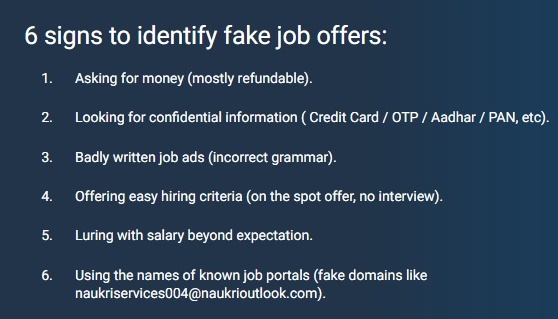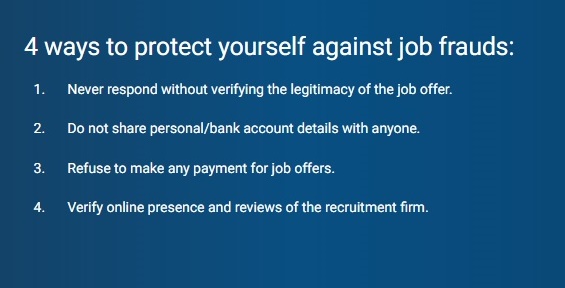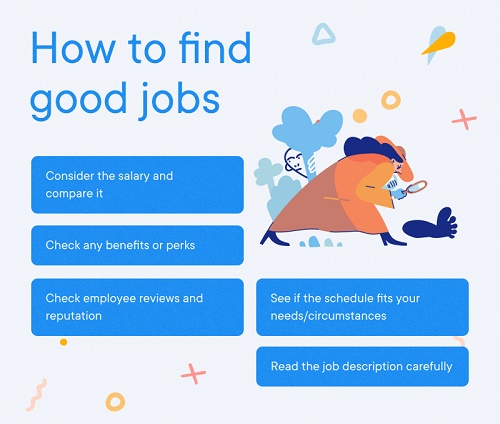Detect fraudulent employers scams
A guide to detect fraudulent employers:
While job seekers are working hard to secure ideal opportunities, it's important to remember that high-profile roles are not easily obtained. Fraudsters may pose as legitimate employers to extract personal details or defraud their victims. Both job seekers and students must remain vigilant when identifying genuine job postings and be cautious of fake or fraudulent employers. There are several important tips that every job seeker should know in order to protect themselves from job scams.

In recent times, many qualified unemployed individuals have been targeted by fraudulent employers. While there are still many genuine employment opportunities offering good packages, connecting with senior professionals and securing a job is not always easy. As a result, the most convenient way to find a job is through online portals. Every day, lakhs of students and job seekers register on these portals in search of employment.
Fraudulent employers exploit this opportunity to collect sensitive personal information, including service fees, photos, bank details, and more. This is known as an employer scam. Some fraudulent employers even demand money in exchange for a job offer—something that is never required by legitimate employers. However, it is not always easy for students or job seekers to identify these scams. It is the responsibility of job centers to educate students and job seekers about common fraudulent practices.

Tips to detect the fraud employers
Use Trusted Job Portals:

There are many job portals like Indeed, Monster.com, LinkedIn, Glassdoor, etc., available online. While many of these websites are trusted, even reputable platforms sometimes carry fake job postings. To detect fraudulent employers and protect your personal information, follow the steps outlined below:
Before formally submitting your online application, check your career management system for the job poster’s reliability profile, trust score, or rating, if available.
Secondly, verify the employer's email address. In genuine cases, the employer's email address should match the organization’s official domain.
You can also check whether the employer's email ID is valid. To do this, simply copy the email address and paste it into a Google search. If the email ID is legitimate, it will typically appear on the first page of the search results.
The organization's official website should appear in the search results. If it doesn’t, cross-check the "Contact Us" section on the website to confirm whether the email domain matches the one provided. If it is a registered organization, employers are not permitted to send official emails from personal email addresses (e.g., @gmail.com, @yahoo.com, @sbcglobal.net, @me.com, etc.).
The Location of the Company:
Verifying the actual location of the organization is also important. To confirm that the organization has a valid address and that the address is genuinely associated with the organization’s name, use Google Maps or another location service. However, for start-up companies, it may not be possible to find a functioning website or sufficient information for verification purposes.

IIn such cases, you can request the business filing documentation that was submitted to the state in which the office is located. Fraudsters often go to great lengths to remain hidden. If it is difficult to find a valid address, contact details, organization name, or similar information, it is likely a scam.
How to protect yourself and your known circles from employer scams?
Fraudulent employers are phishing for the unsuspecting. Job seekers should be cautious about what they share and post online. If you are unsure about certain companies or individuals claiming to represent an employer, contact your local job center for verification.
Here are some rules that both employees and employers should follow during a job search:
-
Employers are not allowed to ask for credit card or bank account numbers, or any personal financial documentation, at any point during your job search or hiring process.
-
Employees should not provide their Social Security number or driver’s license details during the initial application process. Personal information should never be requested at the early stages of hiring.

The representative might tell you that the company does not have a branch in your area and will need your help to get the office up and running. This type of job scam often includes a request for your financial information, supposedly to assist the employer in making payments. However, the employer should never ask you to make an initial investment, such as a payment via wire transfer, bank transfer, or courier.
You may also be offered a large payment or reward unexpectedly in exchange for access to your bank account—often under the pretense of depositing checks or transferring money. Always remember: never process any financial transactions until you fully understand everything about the organization. They may flatter you or promise quick-money opportunities, but such schemes never work out in your favor.

The intent of such employers is to defraud you by convincing you to receive or wire money through your bank account. They will ask you to cash a check or transfer funds to another account. Once you process the check or make the transfer, you’ll discover that the check was invalid. Moreover, you will be held responsible by your bank for any money transferred at your direction to other accounts.
The best and finest solution for job seekers
If you are looking for a job, start by identifying the name of the company and verifying its legitimacy. Confirm key details such as the company’s physical address, logo, email ID, contact person, phone number, official website, and social media links. Visit their official website and navigate to the "Careers" page to explore authentic job openings.

You can check if there are any vacancies available. If yes, you can apply directly for the job. If not, follow the company’s official website and social media pages to stay updated on new openings. Always use the official website when applying for jobs, especially if you're not receiving genuine job offers from other sources.
Detecting Fraudulent Employer Scams: Key Steps to Stay Safe
Identifying and avoiding scams from fraudulent employers requires vigilance and a cautious approach. Here are some essential steps:
-
Research the Company:
Investigate the employer thoroughly. A legitimate company typically has a professional website, consistent branding, and verifiable reviews. -
Verify Contact Information:
Check if the provided email addresses, phone numbers, and contact names match the company's official records. Be cautious if communication is only through personal emails or messaging apps. -
Avoid Upfront Payments:
Real employers never ask for upfront payments for training, software, or job placement. Any request for money should raise an immediate red flag. -
Examine Job Listings Carefully:
Be wary of job offers that seem too good to be true—especially those offering high salaries for minimal work or lacking clear job responsibilities. -
Trust Your Instincts:
If something feels off—such as pressure to act quickly or requests for sensitive personal information—listen to your gut and walk away.
By taking the time to research opportunities and remain cautious, you can avoid falling prey to fraudulent employer scams and secure safer, more legitimate job prospects.






